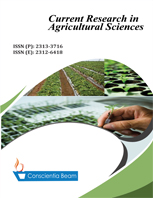Analysis of Climate Change Effects among Rice Farmers in Benue State, Nigeria
DOI:
https://doi.org/10.18488/journal.68/2016.3.1/68.1.7.15Abstract
The study was carried out in Benue state, Nigeria to analyze climate change effects among rice farmers. Questionnaire/interview schedule was used to collect data from a sample of 90 respondents in the study area. Data were analyzed using frequency distribution, percentage, mean score and standard deviation. Findings of the study revealed that majority (82.2%) of the respondents were males; married (96.7%) with a mean age of about 44 years. Major perceived causes of climate change were use of generators which produce fumes (M=2.16), continuous cropping (M=2.11), human activities (tillage) (M=1.94), use of inorganic manure (M=1.92), burning of fire wood (M=1.94), bush burning (M=1.82), deforestation (M=1.80), increase in population which leads to loose of farmland (M=1.80), land degradation due to soil erosion (M=1.60), over grazing of farmland by livestock (M=1.66), and burning of fossil fuel by industries and automobile (M=1.50), among others. Results also indicate that unemployment (M=1.74), desertification (M=1.68), loss of farmland to flood and erosion (M=1.64), increase vulnerability to soil erosion (M=1.56), increase in pests and diseases infestation in rice farms (M=1.52), increase in growth of weeds (M=1.56), easy loss of water from the soil (M=1.48), reduces soil fertility (M=1.42), causes stunted growth in rice crops (M=1.42), among others were perceived effects of climate change in rice production. Human activities such as deforestation, overgrazing of farmland by livestock, use of inorganic manure, etc. should be discouraged in order to cushion the effects of climate change as well as increasing productivity among rice farmers.

